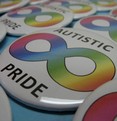 by Jeremy Pierce, Ph.D. There's a relatively new movement in the communities of people who deal regularly with autism and related conditions that's assigned themselves the term "neurodiversity" as a shorthand reference to their commitment to affirming atypical neurological conditions as equally legitimate. This movement shuns the terms 'normal' and 'abnormal' and instead prefers to speak of those who are neurotypical and those who are not. The neurodiversity movement seeks to identify various traits common with autism as neither better nor worse but simply different. This movement should be praised for its recognition that respecting people with autism requires taking into account how differently they take in information, process it, use it, and produce various responses. They rightly emphasize that an atypical neurological state need not be thought of as a disease that needs a medical cure or treatment or a disability that requires taking the person to be deficient. They recommend supporting a person for who they are rather than trying to "fix" them to conform to the standards everyone else has. Some autism advocates on the autistic spectrum insist that they wouldn't want to be made "normal" if a "cure" were ever found. They like being the way they are. There's something obviously right about most of that. The more I read stuff from this movement, however, the more disturbed I get that there's something they're just not seeing, and the good in what I just wrote is blinding a lot of well-meaning people to a serious philosophical error lying behind much of what the neurodiversity movement produces. Consider this story by Karen Kaplan of the Los Angeles Times. She is right to point out that, just because autistic people do badly on certain standardized tests, it doesn't mean they're cognitively deficient. It may well be that the reason a certain person scores low on a certain test is because the test is relying on typical patterns of language use, and someone with autism may be using a different pattern of language use. The underlying cognitive ability being tested for may be stronger than the test shows. That's all correct. But in her rush to make this point, Kaplan completely ignores the fact that the reason someone is scoring low on the test is because of a genuine deficiency in the kind of language use that most people are much better able to engage in. That means there is a lack of ability that comes with autism, even if its manifestation will be different from person to person.
0 Comments
|
Categories
All
Archives
December 2021
|
Photo from Hayzphotos
 RSS Feed
RSS Feed
